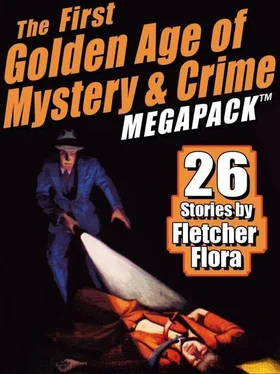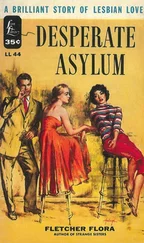She turned away and sat down on the nearest chair. She sat erect, primly, her ankles together. Her purse lay in her lap under her hands, and she could feel the gun in it. Once she even opened the purse enough to slip a hand inside and touch the naked steel. It was an intensely intimate and exciting gesture, like touching the flesh of someone loved, and she nearly whimpered in the excitement of it. But then she must have become quite abstracted and withdrawn, for after awhile, however much time had passed, she became aware that the old man was gone, and the woman with yellow hair and the fur piece was crossing to the door to the next room and was quickly gone also. She continued to sit primly on the chair, no longer exhilarated as before, but quietly assured in a feeling that was more like resignation than anything else, and very soon the man at the desk looked across at her and jerked his head slightly toward the door behind him.
“You can go in now,” he said.
“Thank you,” she said.
She wondered what signal he had received to tell him it was time. Perhaps there was a little light on the front of the desk. Something of the sort that made no sound. Standing, her purse held in both hands in front of her, she walked over to the door and into the next room, from which the yellow-haired woman had apparently gone directly into the hall, and there behind an old desk of dark oak beyond six feet of bare floor was Hugo Weis, whom she would shoot dead in exactly sixteen seconds.
He was so short of stature that only his head and shoulders were visible above the desk, but as she moved toward him, he stood up suddenly and came around the desk to meet her, his stunted and gnarled body exposed, his face touched, when he stopped, by the light from a single window. It was the same face she had seen in the newspaper and floating like an ectoplasmic vision in her dark room at home, obscenely ugly, except for a single difference which was now apparent in the weak light, and she was arrested by this difference, held by it for seconds, and the difference was in his eyes. They were soft eyes, the eyes of a grieving woman.
“My name is Freda Bane,” she said, feeling in these last seconds that it was somehow decidedly important that she identify herself.
When she spoke, it seemed to her that his soft eyes widened with a kind of shock and filled instantly afterward with what seemed to her a light of infinite relief. She had a wild notion that he suddenly recognized her voice, as if it had materialized from a dream he had often had, but had never, until now, quite been able to remember after waking.
“Come in,” he said. “Come in.” His voice was gentle, compatible with his eyes.
It was, in truth, a voice of poignant beauty, with a whisper of sadness running through the sounds of vowels and consonants like the slightest soughing of wind among trees at dusk.
Originally published in Ellery Queen’s Mystery Magazine , June 1961.
Cora Rogan came upon the girl at a curve in the walk where a white birch cast a pattern of light shade. She was sitting cross-legged on the grass under the birch, just at the edge of the walk, and shadows of leaves danced with the warm breeze in her hair and on her white dress.
She was playing jacks. She would lean forward and scatter the small metal pieces on the smooth concrete, and then she would toss a rubber ball into the air, letting it bounce once, and between the time it rose and fell and rose on the bounce, she would scoop up some of the jacks, whatever number was required at that particular stage of the game, and catch in the same hand the ball as it descended. She was wonderfully adept at it.
Cora stood and watched her do her twos and threes without a miss.
If she was aware of Cora’s presence, she gave no sign.
“Hello,” Cora said, after a while. The girl looked up and smiled, holding the jacks and rubber ball in her right hand. She had a small, heart-shaped face with large gray eyes. Although she was very pretty, it was not her prettiness that Cora was struck with, but the serenity in her eyes and smile that seemed to be of a piece with the way she held her hands and head and sat so quietly cross-legged on the grass. “Hello,” she said.
“I was watching you play. Do you mind?”
“Not at all. Why should I?”
“I don’t know. It might make you nervous and cause you to miss.”
“I never get nervous, and I hardly ever miss. Only once in a while, when I get to some of the more difficult things.”
“You’re quite good, all right. I could see that.”
“Would you care to play a game with me?”
“I don’t know how.”
“Oh, it’s very simple. I’ll show you as we go along.”
“All right, but you mustn’t expect me to be much competition.” Cora sat down beside the girl in position to use the concrete walk to play on. She could hear someone whistling a tune behind a spirae a bush farther along the walk, but no one was in sight.
“You must throw out the jacks,” the girl said, “and pick them up while the ball bounces. Then you must catch the ball in the same hand with the jacks. First you do one at a time, and then two at a time, until finally you must pick them all up together. After that, there are some more difficult things to do.”
“Perhaps you’d better explain the more difficult things when we come to them.”
“Yes. I thought that would be better. What you must remember is that it’s very important how you throw the jacks out. You must try to throw them so that it’s easy to pick them up in ones or twos or threes or whatever number.”
“I see.”
“If you touch a jack you aren’t supposed to pick up, or even make it move by pushing another jack against it, that means you miss and must give up your turn.”
“All right. I think I understand it up to the more difficult things.”
“Then you may have first turn.” She handed Cora the ball and jacks, and Cora threw out the jacks and began to play. She went through the ones all right, and through the twos, but she missed on the threes.
“That was very good for a beginning,” the girl said.
“Do you think so? Thank you.”
“If you had thrown out the threes a little more carefully, you could have gone right on.”
“I threw them too hard, I think.”
“Yes, they were too scattered for threes. The ball bounced twice before you could pick them up. Did you understand that it’s a miss if the ball bounces twice?”
“Yes. I understood that.”
“I believe I neglected to tell you.”
“That’s all right. I knew it.”
“Then it’s my turn.”
She gathered up the jacks and threw them out and began to play and was soon through the game as far as she had explained it. Then she began to do the more difficult plays, explaining each one carefully and clearly before attempting it, so that Cora would know in advance exactly what was required of her.
Some of the plays demanded considerable dexterity, but she completed them all in order, after explanations, and then she laughed with pleasure in her skill, at the same time looking at Cora ruefully because of beating her so easily.
“You’re far too good for me,” Cora said.
“Well, it’s mostly a matter of practice. I shouldn’t be surprised if you became quite good after you’ve played a while.”
“I could never become as good as you.”
“Would you like to play on through, just to learn? Misses won’t count. I’ll explain things again as you go along.”
“Oh, no. That wouldn’t be any fun for you.”
“I don’t mind. We could play another game after you’ve practiced.”
“No, thank you. I know when I’m thoroughly beaten.” Cora laughed and stood up, looking down at the shadows of leaves in pale hair. “I’m on my way up to the house to see your mother. Is she there?”
Читать дальше












